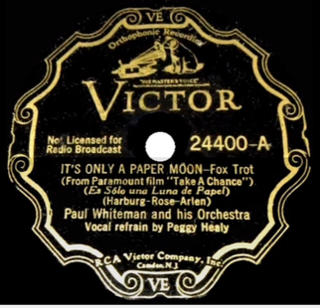"Because" is a song with music and lyrics by Guy d'Hardelot and English lyrics by Edward Teschemacher, originally published in 1902.
"All I Do Is Dream of You" is a popular song. The music was written by Nacio Herb Brown, the lyrics by Arthur Freed. The song was published in 1934. It was originally written for the Joan Crawford film Sadie McKee (1934) when it was played during the opening credits and later sung by Gene Raymond three times. It was also sung in the film by Earl Oxford in a show. The song is also featured in the films Singin' in the Rain, A Night at the Opera, The Affairs of Dobie Gillis, and Crimes and Misdemeanors.
"Nevertheless I'm in Love with You" is a popular song written by Harry Ruby with lyrics by Bert Kalmar, first published in 1931. The song was a hit for Jack Denny in 1931, and was revisited in 1950 by The Mills Brothers, Paul Weston, Ray Anthony, Ralph Flanagan, Frankie Laine and Frank Sinatra, with perhaps the most compelling version being that of the McGuire Sisters.
Shine is a popular song with lyrics by Cecil Mack and Tin Pan Alley songwriter Lew Brown and music by Ford Dabney. It was published in 1910 by the Gotham-Attucks Music Publishing Company and used by Aida Overton Walker in His Honor the Barber, an African-American road show. According to Perry Bradford, himself a songster and publisher, the song was written about an actual man named Shine who was with George Walker when they were badly beaten during the New York City race riot of 1900.
"Too Marvelous for Words" is a popular song written in 1937. Johnny Mercer wrote the lyrics for music composed by Richard Whiting. It was introduced by Wini Shaw and Ross Alexander in the 1937 Warner Brothers film Ready, Willing, and Able, as well as used for a production number in a musical revue on Broadway. The song has become a pop and jazz standard and has been recorded by many artists.

"It's Only a Paper Moon" is a popular song published in 1933 with music by Harold Arlen and lyrics by Yip Harburg and Billy Rose.

"I'll Get By (As Long as I Have You)" is a popular song with music by Fred E. Ahlert and lyrics by Roy Turk that was published in 1928. Versions by Nick Lucas, Aileen Stanley and, most successfully, Ruth Etting, all charted in America in 1929.
"It's Easy to Remember " is a popular song written by Richard Rodgers with lyrics by Lorenz Hart.
"Street of Dreams" is a song and foxtrot composed in 1932 by Victor Young, with lyrics by Sam M. Lewis. There were three successful recordings of the song in 1933 by Guy Lombardo, Ben Selvin and Bing Crosby.
"Wrap Your Troubles in Dreams" (also known as "Wrap Your Troubles in Dreams (and Dream Your Troubles Away)") is a popular song written by Harry Barris with lyrics by Ted Koehler and Billy Moll, published in 1931.
"I Wished on the Moon" is a song composed by Ralph Rainger, with lyrics by Dorothy Parker. Bing Crosby sang the song in The Big Broadcast of 1936.
"I've Got a Crush on You" is a song composed by George Gershwin, with lyrics by Ira Gershwin. It is unique among Gershwin compositions in that it was used for two different Broadway productions: Treasure Girl (1928), when it was introduced by Clifton Webb and Mary Hay, and Strike Up the Band (1930), when it was sung by Doris Carson and Gordon Smith. It was later included in the tribute musical Nice Work If You Can Get It (2012), in which it was sung by Jennifer Laura Thompson. When covered by Frank Sinatra he was a part of Columbia Records.

"Nobody's Sweetheart", also known as "Nobody's Sweetheart Now" and "You're Nobody's Sweetheart Now", is a popular song, written in 1924, with music by Billy Meyers and Elmer Schoebel, and lyrics by Gus Kahn and Ernie Erdman. The song is a jazz and pop standard.
"I Let a Song Go Out of My Heart" is a 1938 composition by Duke Ellington, with lyrics added by Irving Mills, Henry Nemo and John Redmond. The song became a number one hit for Ellington in 1938. Other hit versions the same year were by Benny Goodman, Jimmy Dorsey, Connee Boswell, Hot Lips Page, and Mildred Bailey. It was performed as part of The Cotton Club Parade of 1938.
"I Guess I'll Have to Change My Plan" is a popular song published in 1929, with music by Arthur Schwartz and lyrics by Howard Dietz.
"Snuggled on Your Shoulder (Cuddled in Your Arms)" is a popular song with music by Carmen Lombardo and lyrics by Joe Young, published in 1932.

"Swingin' Down the Lane" is a 1923 song composed by Isham Jones with lyrics by Gus Kahn. Jones' instrumental version was second to "March of the Wooden Soldiers" in the list of top songs for 1923. Other popular versions in 1923 were by Ben Bernie, and The Columbians.
The Touch of Your Lips" is a romantic ballad written by Ray Noble in 1936. The original version of the song, which has become a standard, was by Al Bowlly accompanied by Ray Noble and His Orchestra.

"Waltzing in a Dream" is a 1932 song recorded by Bing Crosby. The lyrics were written by Bing Crosby and Ned Washington. The music was composed by Victor Young.
"The Moon of Manakoora" is a popular song written by Frank Loesser (lyrics) and Alfred Newman (music) for the 1937 Paramount film The Hurricane starring Dorothy Lamour. Lamour sang the song in the film and also made a commercial recording of it. The song "The Moon of Manakoora" is considered a standard and was Loesser's first success as a lyric writer.




